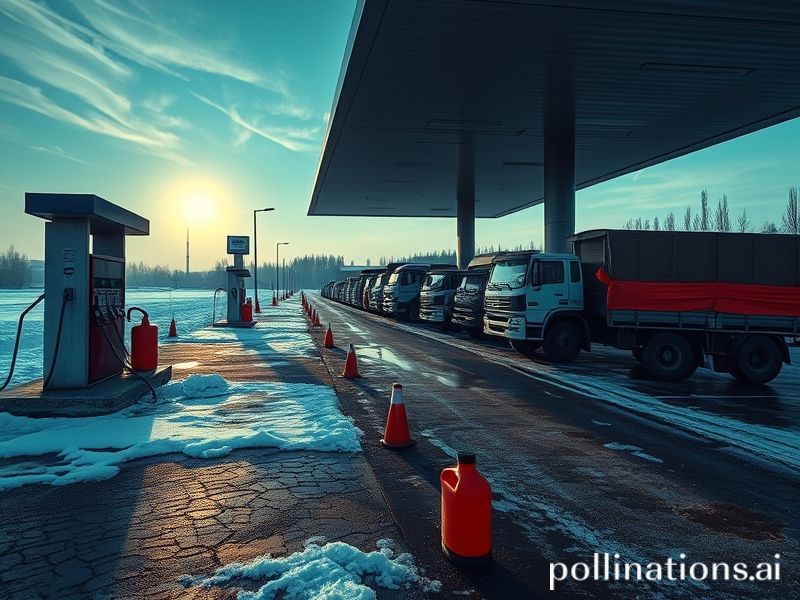Russia’s Fuel Shortage: When the World’s Gas Station Runs Dry—and the Irony Overflows
Russia Runs on Empty: A Global Masterclass in How to Turn Oil into Anxiety
By Our Correspondent in the Departures Lounge, Somewhere over the Caspian
Moscow, late May—At the very moment when Russian state television was boasting that the Motherland’s hydrocarbons could power Europe until the sun burned out, motorists in Krasnodar were queuing for petrol like Soviets in 1989 waiting for toilet paper. The irony, of course, is that Russia still exports more crude than any other country, but apparently forgot to keep a jerry can in the garage for itself. It’s the geopolitical equivalent of a Michelin-star chef living on instant noodles.
The official explanation for the shortages is a tidy piece of bureaucratic origami: “unscheduled maintenance” at refineries, “logistical bottlenecks,” and—our favorite—“seasonal demand.” Translation: drone attacks on the Black Sea coast, sanctions clogging the spare-parts pipeline, and a sudden realization that internal price caps make smuggling fuel to Kazakhstan more profitable than selling it at home. Nothing says free-market efficiency quite like a state monopoly discovering its own Achilles’ heel with a Kalashnikov.
Globally, the hiccup is being felt from the backstreets of Bishkek to the boardrooms of BP. Brent crude ticked up three dollars on the rumor that Russia might—brace yourselves—have to import refined products from Belarus, a country whose last technological breakthrough was the 1984 Minsk refrigerator. Meanwhile, India and China, the world’s favorite clearance shoppers for embargoed commodities, are watching closely to see if they can pick up another ten million barrels at “please-take-it” prices. Analysts in Singapore have coined the term “panic arbitrage”: the art of buying cheap crude from a country that can’t refine it fast enough, then flipping the gasoline back through shell companies registered where subpoenas fear to tread.
Europe, for its part, is enjoying a moment of smug Schadenfreude. Having weaned itself off Russian pipeline gas with the grim determination of a chain-smoker switching to menthols, the continent now discovers that watching Russia ration its own diesel is almost as satisfying as catching the ex texting their therapist. Still, Brussels keeps a diplomatic straight face, warning that any “secondary sanctions” on Russian refined products could boomerang into higher prices at the pump in Düsseldorf. In other words: we’ll hurt them by hurting ourselves slightly less, a strategy borrowed from the timeless art of cutting off your nose to spite someone else’s face.
The broader significance? Call it the first energy crisis of the drone age. Cheap quadcopters have done what thirty years of environmental lobbying could not: convinced oil executives that maybe, just maybe, having all their refining capacity within 500 km of a contested border was sub-optimal. Insurance underwriters in London—those eternal optimists—have already added a “war-adjacent surcharge” to tankers plying the Black Sea. Shipping rates have risen faster than a Ukrainian sea drone on a mission, and every detour around the Cape of Good Hope adds another week of carbon emissions the planet can ill afford. Mother Nature files yet another complaint; the clerk sighs and stamps it “pending.”
Back in Russia, the government has adopted its traditional crisis posture: a 30-day ban on fuel exports, a promise to throw unnamed officials in jail, and a patriotic campaign urging citizens to “drive less for the Motherland.” Muscovites respond by posting photos of their Teslas—imported via Georgia, naturally—captioned “sanctions-proof.” The Kremlin’s spin doctors insist the shortages are temporary, a claim undercut slightly by the fact that they’re broadcasting from a studio powered by a diesel generator parked conspicuously outside the window.
Conclusion: In a world already running on fumes—politically, environmentally, existentially—Russia’s self-inflicted fuel crunch is less an isolated mishap than a darkly comic trailer for the next decade. When the planet’s premier petrostate starts rationing petrol, you know the bar for absurdity has been raised—or lowered, depending on your tolerance for gallows humor. For the rest of us, the lesson is simple: stock up on popcorn (and maybe a bicycle). The geopolitical road trip is far from over, and the next gas station might be farther away than it looks.







